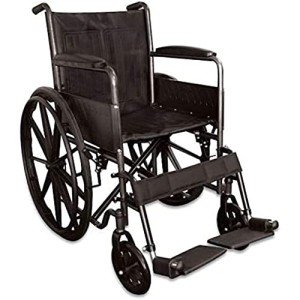Bariatric Transport Wheelchair
Designed to be pressed by caregivers, transport chairs include smaller front wheels and larger rear wheels. They are a popular choice for users with minimal mobility who can not walk independently.
When looking for a lightweight bariatric transport wheelchair, consider the user's needs and how they'll utilize the chair. Also, measure any entrances and other areas the chair will travel through.
Seating
Bariatric transport chairs include a large 22 to 36 inch large seating location that accommodates extra-large users. have a peek at these guys is made from breathable nylon and includes padded arms that can be removed and swing-away footrests. Unlike standard wheelchairs, which are ideal for average body weights, bariatric chairs have heavier frames constructed from enhanced materials and larger rear wheels that make it easier to press them. Speak to a mobility expert for more information about your options and to identify which type of wheelchair is right for you. Bariatric wheelchairs are often covered by insurance suppliers like Medi-Cal if your medical condition fulfills their coverage requirements.
Frame
Bariatric transport wheelchairs use heavy-duty frames made of reinforced materials like steel and have broader seats than standard wheelchairs. They are developed for people with greater body weights and can hold an optimum weight capacity of 700 pounds. They also have bigger rear wheels, that make them much easier for caregivers to push. Bariatric wheelchairs are frequently covered by insurance such as Medi-Cal, depending upon the patient's particular medical needs and medical diagnosis. Ask a healthcare professional or mobility specialist to assist choose the right chair for your distinct requirements.
Click on this link for more info. Medline Bariatric Transport Chair. Deep Red Hammertone Frame.
Weight
While standard wheelchairs have lighter frames and smaller wheels, bariatric transport chairs include heavier-duty products and a broader seat to accommodate users who weigh more than average. Since of their specialized design and building and construction, they tend to cost more than standard chairs. Nevertheless, some insurance coverage programs like Medicare and Medi-Cal might cover the expense of these chairs if the user fulfills the criteria for coverage. To find out more about which chair is right for you, get in touch with a rehab specialist today.
Wheels
Bariatric transport wheelchairs have bigger rear wheels than basic models, making them simpler to push. They're frequently utilized in hospitals and home settings, where the chair is pressed by caregivers. The extra-large rear wheels also permit the chairs to navigate a range of surface, including outdoors.
Basic wheelchairs generally have smaller sized wheels, that make them more maneuverable inside however less appropriate for daily usage on outside streets and other surfaces. Mobility professionals advise talking to a doctor or mobility expert to select the very best wheelchair for your particular needs and objectives.

This heavy-duty, nylon reinforced steel transport chair supports patients up to 500 pounds and includes a large 22" seat, cushioned desk-length armrests, swing-away footrests and hand brakes. The 12-inch rear wheels guarantee a smooth ride in any environment.
